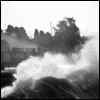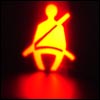
One of my favorite quotes is the following: “An entire sea of water can’t sink a ship unless it gets inside.” There is so much negativity that surrounds us, people and situations aiming to bring us down, but it can happen only if we allow them within. There is the ship of our mind, the ship of our heart and the ship of our souls.
I find the parallels between protecting ourselves emotionally and the guidelines for protecting oneself physically to be amazingly similar. It’s been about two weeks since Hurricane Sandy wreaked havoc on the East Coast, as well as other places throughout the world. I am only now starting to pack away all the supplies we had ready to go. The kids have finally put back their clothing that was sitting by the door in case of an evacuation. And all the water we froze in bottles and containers has just been defrosted.
I find the parallels between protecting ourselves emotionally and the guidelines for protecting oneself physically to be amazingly similarAnd as I put away each item, I think about the significance and what it represents. Reflecting back, there were rules we followed for our safety. Namely, we were instructed to do the following:
1. Stay home.
2. Have all nonperishable food and water accessible.
3. Have flashlights, candles or other sources of light accessible.
4. Have phones and computers fully charged.
5. Bring inside what you can.
As the winds began to gain speed, the first thing we were told was to stay inside. No matter how exciting and wonderful things are outside, when the situation becomes dangerous, it is home we must go. But to do this, we must feel at home within ourselves, and we have to make our homes a safe place. When our home is empty, we can’t provide ourselves with what we need. There is nothing wrong with outside help, and we most definitely should have friends who support us. But we must provide ourselves with the essentials.
When our home is empty, we can’t provide ourselves with what we needWhat was required to make our homes a safe place? We needed to ensure we had what we might need, without relying on outside help if we were to lose power or it wasn’t safe to leave. So we stocked up on water, nonperishable food, flashlights and first-aid kits, and we charged our phones. As prepared as we were, we did not want to lose contact with the outside world. We should always be able to reach out if need be, to ask others for help.
We needed light. When we are surrounded by darkness, we need to provide our own source of light. And we always have that light within. Sometimes we can’t even see it until the outside light goes out or is diminished. But it is always there. Our soul is compared to light, and is a piece of G‑dliness; therefore it is a light that will never be extinguished. As it states in Micah, “When I sit in darkness, G‑d is my light.” We just changed the clocks back. Our waking hours are filled with more darkness than any other time of the year. We must ensure that we counter that with the light only we can create and provide.
We need to know what to bring inside, and what to leave, perhaps even close by, but outsideMy youngest daughter made an interesting observation as she played with the flashlights. She commented how we can have a flashlight, but not a flashdark. She was noticing how, if the room is dark, we can always add light and take away the darkness. But if the room is filled with light, it is really hard to make the light go away. The best we can do is close our own eyes and refuse to see it. We can make it dark for ourselves, but it is very hard to make it dark.
Then there is the outside. We can’t prevent it if a tree is to fall or branches go flying, but we can try to keep them out of our path as much as possible. We bring inside what we want to protect. We tie down what we can that remains outside. We move our car into a safe place. And if things get bad enough, and it is no longer safe, we evacuate.
The outside world has so many wonderful things we should draw from and incorporate into our lives. But not all of it is healthy or positive. We need to know what to bring inside, and what to leave—perhaps even close by—but outside. And we need to make sure that what is outside won’t go flying away or flying towards us. Ultimately, what we don’t bring into our homes, we don’t want coming in uninvited. We do the utmost to ensure this not happen, be it with sandbags or taped windows. So too, there are aspects of the world that we may utilize but that are not an intrinsic part of us.
A safe home of another is always better than a dangerous home of our ownAnd then we must have that evacuation plan. When we learn that our home is no longer safe because the outside influences are just too great, just too dangerous, we remove ourselves. We need to know our limits. We need to know when the boundaries and borders we have created are just not strong enough. Because if that water gets inside, that is when it can sink us. But only if it gets inside and we are still there. So when that water becomes too threatening, we use our backup plan. We remind ourselves that we have others who care for us, others who will take care of us, and we go to them. It won’t be our home, but a safe home of another is always better than a dangerous home of our own.
How powerful that the Psalms that were recited on the very day of Hurricane Sandy, the 13th of the month of Cheshvan (corresponding to 10/29/12), read as follows:
“Deliver me, O G‑d, for the waters have reached until my soul! I have sunk in muddy depths without foothold; I have come into deep waters, and the current sweeps me away.”
We must prepare. We must plan. We must be ready. But we must always remember Who runs this world. And that no matter where we go, we are not alone. And when we live with that, we really are always home.






